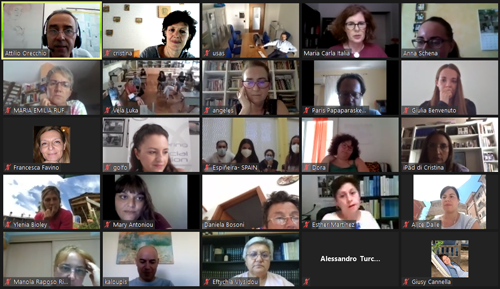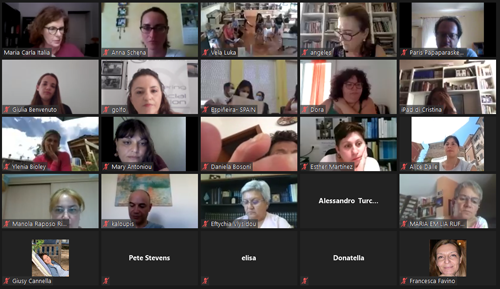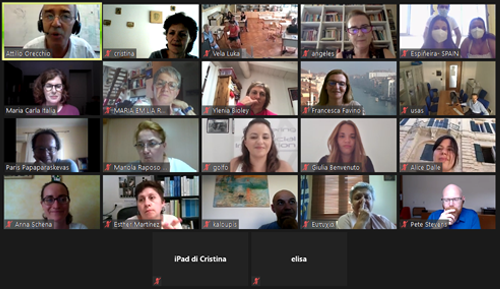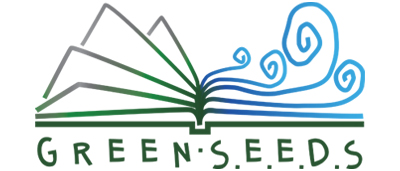GREEN S.E.E.D.S. for INDIRE – Piccole Scuole
Cristina Marin and Nicolò Vedovi from IC Bosco Chiesanuova presented GREEN S.E.E.D.S. at the webinar organised by Giusy Cannella and Jose Mangione from INDIRE - Piccole Scuole "Dal reale al virtuale. Strategie per ampliare l’ambiente di apprendimento" (From real to virtual. Strategies to expand the learning environment), as part of three days of online meetings – from 10 to 14 December 2020, open to all on innovative teaching methods: extended learning environment, bifocal modelling, theatre and education. The project was promoted in collaboration with the Tuscany Region for the training of Elban schools (a little island, in Italy). Our focus has been on distant teaching and learning between schools in different European Countries.
https://www.indire.it/2020/12/03/tre-giorni-di-studio-su-didattica-e-territorio/GREEN S.E.E.D.S. joins the Education for Climate Coalition team
The Erasmus+ GREEN S.E.E.D.S. project, in which the Valle d'Aosta Department of Education is a partner, has been selected as good practice in the survey promoted by the European Commission for climate education and invited to a series of focus groups with the aim of creating a European climate movement led by teachers, students, schools and universities and their communities through bottom-up actions.
The Education for Climate Coalition is a flagship initiative of the European Education Area, which aims to mobilise the education and training community to work towards achieving a climate neutral and sustainable European Union.
The coalition's work is guided by five priorities: developing green skills, training teachers, promoting behavioural change, linking education and science, and raising collective awareness.
The survey is part of the Education for Climate Coalition, an initiative to achieve climate neutrality and promote sustainable development, of DG EAC and the JRC, which are working on identification criteria for sustainable education projects in which concrete experiences promoted at local, regional and national level emerge.
Alice Dalle - contact person for the GREEN S.E.E.D.S. project and coordinator of the activities, which involve pupils in the first cycle of education at the "Abbé Trèves" school in Saint-Vincent - will take part in the meetings promoted as part of this initiative, bringing the experience of the Valle d'Aosta Region.
The focus groups, which began on the 11th March, will continue until June 2021 and will also directly involve some of the students who are working on the project.
The survey is part of the Education for Climate Coalition, an initiative to achieve climate neutrality and promote sustainable development, of DG EAC and the JRC, which are working on identification criteria for sustainable education projects in which concrete experiences promoted at local, regional and national level emerge.
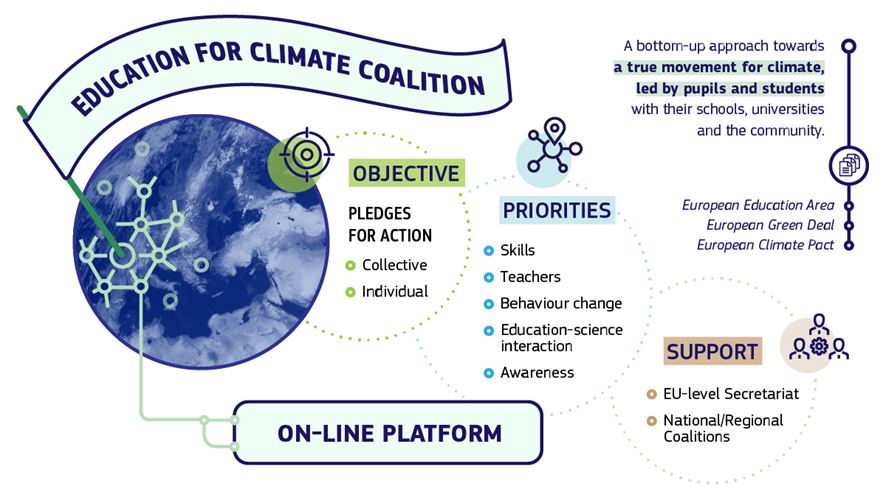
Green S.E.E.D.S. ONLINE CONFERENCE 13 July 2020
On 13th of July 2020, more than 30 participants coming from Italy, Spain, Croatia, Greece and Cyprus attended the online conference to present the first Intellectual Output of the European project GREEN S.E.E.D.S. - Synergy and Environment to Empower Decentralized Schools: the “Toolkit GREEN S.E.E.D.S.”, five modules of three units each, providing an exhaustive support to the needs of the teachers working in small schools:
- 1. Seeds for BOOSTING
- 2. Seeds for TEACHING
- 3. Seeds for MANAGING
- 4. Seeds for COMMUNICATING
- 5. Seeds for NETWORKING
The five Modules, ready by the end of January, have been the object of a double training: the first, held in March, addressed to the Partners’ responsible who, in turn, trained their local teachers (April-June). Thanks to the hard work done and the engagement and interest of all the teachers involved, we have decided to invite them to relate and debate on their training experience and the contents of IO1, so as to share them with their colleagues from different Countries, to be confronted on the many issues of the units with reference to their daily experience.
How to support mountain and island schools, how to motivate teachers, how to use new technologies, how to get students involved in school life, what training to provide to teachers and what contents for students of peripheric schools: these are the key topics discussed during the meeting by the European coordinators, the teachers and education experts and special guests involved within the project.
The Covid-19 emergency has made the issue more urgent and current: the schools located in the islands and in the mountains have not only developed online methods and tools to fight cultural and geographical isolation but these schools also have positive models of collaboration with local actors, enhancing the community sense of belonging and environmental education subjects.
The “Toolkit GREEN S.E.E.D.S.” presented by Ángeles Parrilla Lata, from the University of Vigo (author of the toolkit, together with Golfo Kateva, from Synthesis Center), is useful for the primary and secondary school teachers who can test new educational models of sustainable development and new forms of consumption, as suggested by Attilio Orecchio, president of the leading Partner, Glocal Factory (IT).
According to the Project coordinator Maria Carla Italia, this model allows to help turning little, decentralized schools from a problem into a resource, by motivating teachers and actively involving student families and local stakeholders to address local issues.
During the meeting, each group of teachers presented the activities carried out during the training, pointing out the main issues they had been confronted to.
The experience of the teachers in Cyprus enhanced the importance of children and teachers’ “sense of belonging to the territory” with interactive activities together with the local community.
The practices of the Vela Luka school, Croatia, developed “training techniques for teachers”, while the small school in the rural area of Valicia, Spain, tested “collaborative and cooperative learning” with students, families and schools. The Bosco Chiesanuova and Valle d’Aosta schools, Italy, developed innovative “communication tools and activities” between teachers and students. The school from the Isle of Chios, Greece, presented a series of units used by educators for “online and offline learning”, fortifying teachers’ networks and new methodologies among the schools
Emphasis has been placed on the need for a network of schools, not only locally but at national and European level and on the use of the online tools and the best practices, also thanks to the eTwinning Platform, whose responsible Donatella Nucci (Head of the eTwinning National Support Service of the Italian National Agency INDIRE) joined our meeting to address her welcome message.
Francesca Favino, from USR Veneto, confirmed the needs of educational policies at local, national and European level supporting the activities of small schools, together with the “Manifesto of the little schools” developed by Indire, a point of reference for the Education Institutions sustainability, as remarked by the Indire researcher Giusy Cannella, who participated to our meeting with the experience of the project “Piccole Scuole”, hoping the enhancement of the network of little schools at European level.
Watch the conference on YouTube
